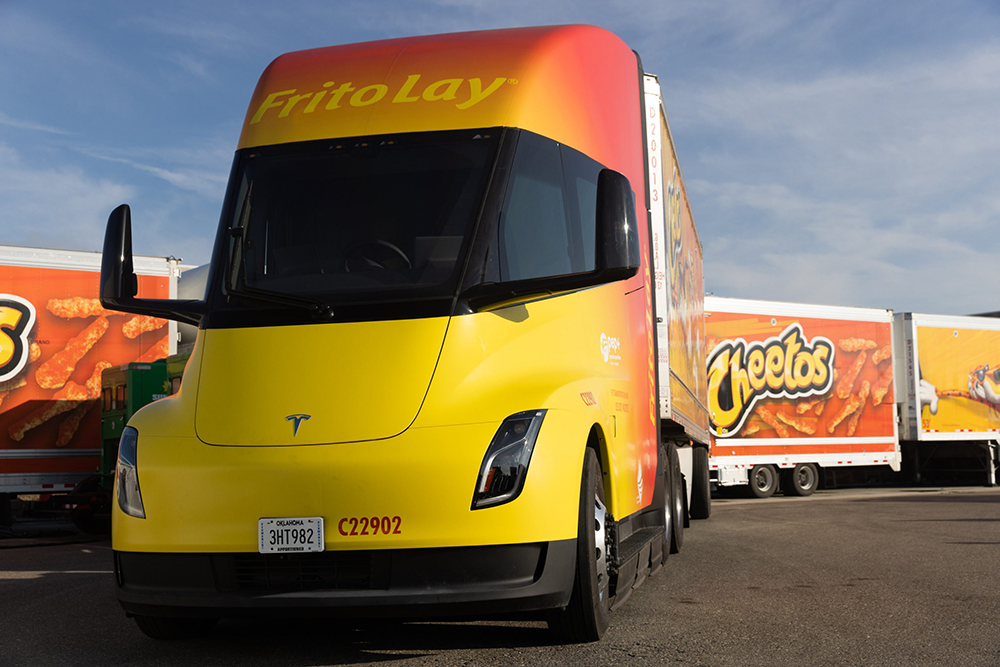
去年12月的新闻发布会上,埃隆·马斯克兴奋地宣布,他已经向百事可乐公司(PepsiCo)商业交付了首台新型电动重卡,称这款新车型是“路上最牛逼的卡车”。他声称特斯拉Semi是减少碳排放的重要一步,可以用更清洁、更安静的电动车取代肮脏的燃油卡车。
这款电动重卡最初于2017年亮相,原计划于2019年投产,经过四年的等待,终于揭开了面纱。
然而,美国国家公路交通安全管理局(National Highway Traffic Safety Administration)上周发布的一则召回通知显示,特斯拉仍在苦苦努力提高这款卡车的产量,两周内可能只能生产一辆。
周二,美国国家公路交通安全管理局宣布,11月30日至3月15日生产的特斯拉卡车需要更新软件。据Elektrek报道,本次更新可解决一个允许司机无视未锁车门警告的软件漏洞。
该公告还公布了召回涉及的产品数量:共36台。
这个数字与百事公司称自己目前拥有的卡车数量一致。今年2月,百事供应链副总裁迈克•奥康奈尔向美国全国广播公司财经频道(CNBC)表示:“我们在莫德斯托有15台,目前正在铺开……在萨克拉门托有21台。”
上周的召回是特斯拉Semi的第二次召回。3月中旬,美国国家公路交通安全管理局发布的一则通知涉及特斯拉11月30日至2月28日期间生产的35辆卡车。Elektrek指出,这两份召回通知意味着,在15天的间隔内,特斯拉只生产了一辆卡车。
也有可能,特斯拉生产的部分卡车不在召回之列,或者该公司自3月中旬以来已经提高了产能。然而,这些数据足以表明,该公司远未实现到2024年底在北美生产5万辆卡车的最初目标。
(相比之下,根据美国全国汽车经销商协会的数据,2022年,美国企业共计购买了25.4万辆“8级”汽车,即包括特斯拉Semi在内的重卡。)
特斯拉没有立即回应置评请求。
2023年第一季度,特斯拉在全球生产了近44.1万辆汽车。
该公司正在加大对卡车生产的投资,斥资36亿美元扩建其内华达州超级工厂的设施。据Elektrek今年3月报道,内华达州的一条新生产线计划每周生产五辆卡车。
然而,马斯克本人却淡化了他此前定下的生产目标。上周在德克萨斯州举行的一次会议上,马斯克预测,特斯拉要到明年年底才能大量生产Semi。他提到的原因包括电池供应等。
他说:“今后对电动车的需求将大规模增加,我们需要竭尽所能才可以跟上需求。”(财富中文网)
译者:Agatha
去年12月的新闻发布会上,埃隆·马斯克兴奋地宣布,他已经向百事可乐公司(PepsiCo)商业交付了首台新型电动重卡,称这款新车型是“路上最牛逼的卡车”。他声称特斯拉Semi是减少碳排放的重要一步,可以用更清洁、更安静的电动车取代肮脏的燃油卡车。
这款电动重卡最初于2017年亮相,原计划于2019年投产,经过四年的等待,终于揭开了面纱。
然而,美国国家公路交通安全管理局(National Highway Traffic Safety Administration)上周发布的一则召回通知显示,特斯拉仍在苦苦努力提高这款卡车的产量,两周内可能只能生产一辆。
周二,美国国家公路交通安全管理局宣布,11月30日至3月15日生产的特斯拉卡车需要更新软件。据Elektrek报道,本次更新可解决一个允许司机无视未锁车门警告的软件漏洞。
该公告还公布了召回涉及的产品数量:共36台。
这个数字与百事公司称自己目前拥有的卡车数量一致。今年2月,百事供应链副总裁迈克•奥康奈尔向美国全国广播公司财经频道(CNBC)表示:“我们在莫德斯托有15台,目前正在铺开……在萨克拉门托有21台。”
上周的召回是特斯拉Semi的第二次召回。3月中旬,美国国家公路交通安全管理局发布的一则通知涉及特斯拉11月30日至2月28日期间生产的35辆卡车。Elektrek指出,这两份召回通知意味着,在15天的间隔内,特斯拉只生产了一辆卡车。
也有可能,特斯拉生产的部分卡车不在召回之列,或者该公司自3月中旬以来已经提高了产能。然而,这些数据足以表明,该公司远未实现到2024年底在北美生产5万辆卡车的最初目标。
(相比之下,根据美国全国汽车经销商协会的数据,2022年,美国企业共计购买了25.4万辆“8级”汽车,即包括特斯拉Semi在内的重卡。)
特斯拉没有立即回应置评请求。
2023年第一季度,特斯拉在全球生产了近44.1万辆汽车。
该公司正在加大对卡车生产的投资,斥资36亿美元扩建其内华达州超级工厂的设施。据Elektrek今年3月报道,内华达州的一条新生产线计划每周生产五辆卡车。
然而,马斯克本人却淡化了他此前定下的生产目标。上周在德克萨斯州举行的一次会议上,马斯克预测,特斯拉要到明年年底才能大量生产Semi。他提到的原因包括电池供应等。
他说:“今后对电动车的需求将大规模增加,我们需要竭尽所能才可以跟上需求。”(财富中文网)
译者:Agatha
Elon Musk giddily announced the first commercial delivery of his new electric-powered container truck to PepsiCo at a press conference last December, calling the new model “the most badass rig on the road.” He pitched the Tesla Semi as a major step towards reducing carbon emissions, replacing dirty gas-powered trucks with cleaner, silent electric models.
The reveal was the culmination of a four-year-long wait for the electric container trucks, originally unveiled in 2017 and originally targeted for production in 2019.
Yet a recall notice released last week by the National Highway Traffic Safety Administration suggests the company is still struggling to ramp up production of the container truck, with potentially just one truck produced in a two-week period.
On Tuesday, the NHTSA announced that Tesla trucks produced between Nov. 30 and March 15 will need to have their software updated. The update resolves a software flaw that allowed drivers to dismiss warnings of an unsecured door, according to Elektrek.
The notice also shared the number of units covered by the recall: a total of 36.
The number aligns with the number of trucks PepsiCo currently says they own. “We have the 15 in Modesto that we’re launching…and then we have 21 in Sacramento,” Mike O’Connell, Pepsi’s vice-president for supply chain, told CNBC in February.
Last week’s recall is the second involving the Tesla Semi. In mid-March, the NHTSA issued a notice covering 35 units produced between Nov. 30 and Feb. 28. Elektrek notes that the two recall notices implies that Tesla managed to produce just one truck in the 15-day window.
It’s possible Tesla produced Semis not covered in the recall notice, and that the company has ramped up production since mid-March. Yet the numbers suggest that the company is far from its original target of 50,000 trucks produced in North America by the end of 2024.
(To compare, companies bought 254,000 “Class 8” vehicles—a category of heavy truck that includes the Tesla Semi—in the U.S. in 2022, according to the National Automobile Dealers Association.)
Tesla did not immediately respond to a request for comment.
Tesla produced almost 441,000 cars globally in the first quarter of 2023.
The company is investing more in truck production, spending $3.6 billion to expand its facilities in its Nevada Gigafactory. A new production line in Nevada plans to produce five trucks a week, reported Elektrek in March.
Yet Musk himself is downplaying his earlier target for Semi production. At a conference in Texas last week, the Tesla CEO forecast that the carmaker won’t be able to make large volumes of the Semi until the end of next year. He cited issues with battery supply.
“The future is a massive increase in electricity demand, and it’s going to take everything that we’ve got just to keep up with it,” he said.






